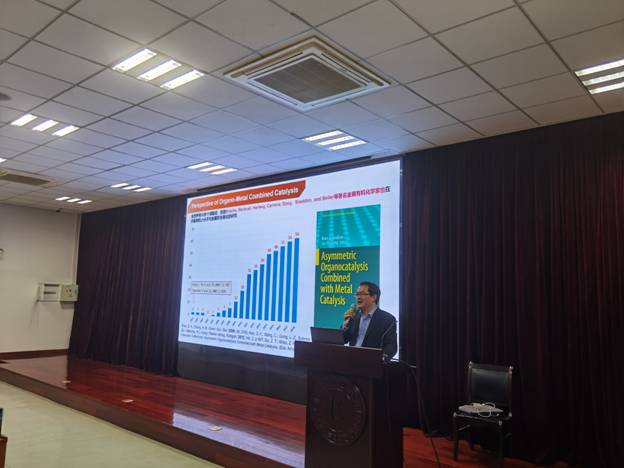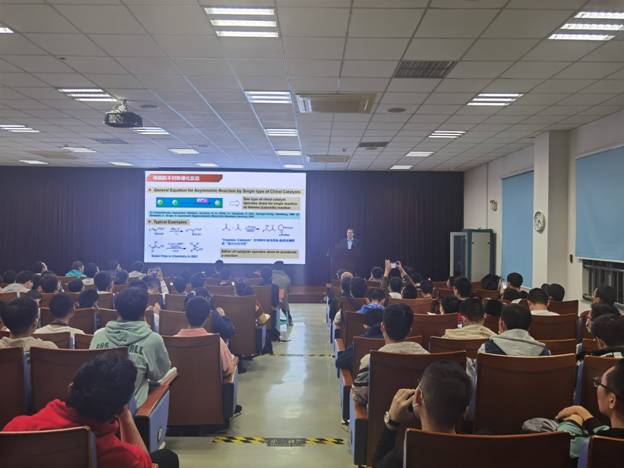Prof. Liuzhu Gong from USTC Attended the Boling Lecture
On October 9th, Prof. Liuzhu Gong (University of Science and Technology of China, USTC) attended the Boling Lecture of College of Chemistry, Nankai University, and gave a report entitled Asymmetric Organo-Metal Combined Catalysis: Our Journey and Perspective in the Academic Lecture Hall of Shixian building, Balitai Campus. All the students from Boling classes and other teachers and students of College of Chemistry participated in this report.
In the nearly two-hour report, Professor Gong shared his researching experiences in the field of asymmetric catalysis in the past two decades, and systematically introduced the ins and outs of the combined catalytic chemistry of transition metals and small molecules. The report is detailed & substantial, vivid to understand, and enlightening to the listeners.

Synthetic chemistry is of great significance to the development of human society, such as developing advanced asymmetric synthesis methods can provide key technologies for the pillar industries of the national economy like medicine, materials, and chemical industry. Prof. Gong first started with fundamental organic chemistry knowledge, to introduce the characteristics and paradigms of transition-metal and small-molecule catalysis, and then pointed out the advantages of asymmetric tandem catalysis methods. Afterwards, using chiral imines, Bronsted acids and chiral nucleophiles to combine with transition-metal catalysis as examples, Gong introduced their research in this field. During the report, Prof. Gong not only introduced their scientific progress, but also shared his own researching experience and reflections.
In the questioning session, Prof. Gong answered questions about the compatibility of combined catalytic reactions, design on reaction process, and project establishment. The report ended with warm applause.

The Boling Lecture is an important measure for the exploration and practice of the innovative chemical talent training model of the College of Chemistry, inviting top chemists from home and abroad to give academic reports to undergraduates of the Boling Class of ChemistryA in order to share scientific research experience, broaden academic horizons, and encourage students to establish a long-term life goal then work hard for it.
Brief introduction of the lecturer:
Prof. Dr. Liuzhu Gong, born in October 1970, graduated from the Department of Chemistry, Henan Normal University in 1993. He obtained a master's degree from Chengdu Institute of organic chemistry, Chinese Academy of Sciences in 1996. He studied for a doctor's degree in the Institute of chemistry, Chinese Academy of Sciences from 1996 to 2000 (during which he was a visiting scholar at the University of Virginia, 1998-2000), and obtained a doctorate degree of Science in the Institute of chemistry, Chinese Academy of Sciences in July 2000. He worked in Chengdu Institute of organic chemistry, Chinese Academy of Sciences from 2000 to 2005, successively as assistant researcher, associate researcher and researcher (during this period he was supported by German Humboldt research scholarship and worked in the Institute of organic chemistry, University of Munich, Germany from 2003 to 2004). Since January 2006, he has been a professor at the University of Science and Technology of China. Prof. Gong was funded by the national outstanding youth fund in 2003, and in 2016 he was rated as “Leading talents of ‘ten thousand talents plan’”. He is mainly engaged in organic synthesis methodology, asymmetric catalysis and total synthesis of natural products. He has published more than 160 papers in international academic journals as the corresponding author, and has been cited more than 10,000 times by others in SCI. Prof. Gong has successively won the Youth Chemist Award of the Chinese Chemical Society (2003), the Organic Synthesis Creation Award of the Organic Chemistry Committee of the Chinese Chemical Society (2005), the National Excellent Doctoral Dissertation Instructor (2008 & 2010), the Chinese Academy of Sciences-Bayer Young Scientist Award (2009), the Youth Knowledge Innovation Prize of the Chinese Chemical Society and BASF Company (2009), and the Youth Chirality Chemistry Award of the Chinese chemical society (2012). He also won the first prize of Science and Technology Award of Anhui Province (2012) and the second prize of National Natural Science Award (2013).

